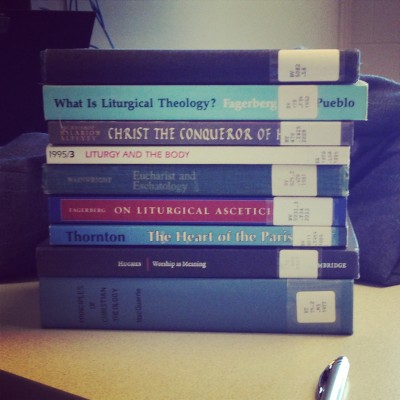My goal is to have my sermon notes posted a full two weeks in advance. However, that has proven most difficult recently. Feel free to “Subscribe” to my blog on the right-hand side of the passage so you can receive automatic updates when I post my notes.
If you’re new to my Sermon Notes, you can read about why I prepare them here. They aren’t just for preachers, they’re for everyone!
Thesis
To proclaim God’s truth (boldly) and minister his justice (with compassion) is to respond gratefully to God’s actions. Simply put: I proclaim the truth because I have encountered and know the truth; I minister God’s justice because God has revealed himself as both just and compassionate. Gospel proclamation and ministry do not originate with the good intentions of men and women; no, to suggest such a thing is to put the cart in front of the horse. Gospel proclamation and ministry are always the oblation of the church—a sacrifice of praise and thanksgiving—for what God has already accomplished. Friend, be at peace, God has acted, is acting and will continue to act for the good of those who love him and on behalf of his whole creation. Though many atheists and skeptics would have us wonder if God is active, the real question is, “How then shall we respond to his activity?”
Analysis
Collect
Keep, O Lord, your household the Church in your steadfast faith and love, that through your grace we may proclaim your truth with boldness, and minister your justice with compassion; for the sake of our Savior Jesus Christ, who lives and reigns with you and the Holy Spirit, one God, now and for ever. Amen.
Bold proclamation and compassionate justice are the two themes that leapt out at me as I read this Collect over and over. The lectionary has afforded us many opportunities over the last few weeks to discover the meaning of steadfast faith and love; particularly the two weeks spent in John 15 during Eastertide. The Collect this week, for me, does more than simply collect our thoughts: it offers two tangible points of application.
What does it mean and look like for us to proclaim God’s truth with boldness? What exactly is God’s truth? How can we minister God’s justice with compassion? What does God’s justice look like?
Finally, and perhaps most importantly, how can and should we do this as the church?
God is truth and the truth of God is most fully known and revealed through the incarnation, ministry, crucifixion, resurrection and ascension of Jesus. To proclaim God’s truth is to proclaim Jesus of Nazareth, the faithful Israelite, as both crucified and risen. We do so boldly because the world does not recognize this as being truth and because we know that the history of the world and the purpose of this life both turn upon the hinge that is Jesus. We proclaim boldly because we have a conviction—not just a mere opinion—that the King of kings and Lord of lords will one day return to finalize the coming of his kingdom and he will judge both the quick and the dead.
This brings us nicely to the second part of the collect: the ability to minister God’s judgment places us firmly within the sovereignty of Christ. We do not minister God’s judgment in ways that are advantageous to us—both as individuals and as God’s household, the church—but as coheirs of his kingdom and as his disciples. In and through Christ we have been given a glimpse into the nature of God’s kingdom and we have been invited to begin living as kingdom citizens in the here and now.
As we dig into the lessons for this week we may find some other images for bold proclamation and compassionate justice in action.
Old Testament – Ezekiel 17:22-24
The historical context surrounding our OT passage is a bit confusing. Verses 22-24 are part of a larger passage (Ezekiel 17:1-24) dealing with the politics of Israel and the prediction of disaster. Zedekiah had rebelled against Babylon by making a deal with Egypt and Israel would again be taken over by foreign oppressors. The imagery of two eagles suggests two different national powers that would have authority over the vine (Israel). While this is interesting from a historical perspective, we can actually move forward without laying too much groundwork apart from what I’ve just done. Just keep in mind that the historical context of this passage is both post deportation and pre-fall of Jerusalem.
The main actor in verses 22-24 is YHWH. Juxtaposed against the foolish political actions of Zedekiah, YHWH is revealed as the one who will take the branch and establish it on the mountaintop of Israel. God will provide for his people, God will cause the branch to prosper, God will give shade to all creatures through the growth of the branch, and God will cause it to become a noble cedar.
This is a passage of hope and promise more than anything else. As Israel begins (literally) to move into captivity (historically), she is embarking on a many century-long journey throughout which she will be passed from one oppressor to another. YHWH’s promises of land, purpose, people and provision seem far off at this point, a distant memory. This captivity was a result of Israel’s overwhelming sinfulness, of her habitually rejecting YHWH’s covenant. And yet YHWH still speaks hope and life to his people. He will make goo on his promises and do all that he has told Israel.
The possibilities here are endless based on the imagery, but think for a second about the apocalyptic nature of the preceding verses. Ezekiel was foretelling the end of Israel’s sovereignty but God provides hope of a different kind. As New Testament people we know that Jesus is both the faithful Israelite and the king of all things. Jesus was planted firmly, through the cross, on the lofty mountaintop of Israel and under the shadow of his cross does his church reside. It’s a bit of a stretch but I think the imagery holds. God accomplished his promises to Israel through Jesus and as a result all of creation can have new life in him.
Psalm 92:1-4, 11-14
Psalm 92 is part of a three-psalm unit (Psalms 90-92). Psalm 90 is the complaint, Psalm 91 the wisdom, and Psalm 92 the hymn of praise and thanksgiving. While it wouldn’t be possible or prudent to read all three Psalms on Sunday, it would be a good idea for the preacher and hearer to read Psalms 90 and 91 throughout the week in preparation. The reader should note that the lectionary breaks up the Psalm in a very random selection. The Psalm is ordered this way: 1-3, 4-5, 6-8, 9-11, 12-14 but the RCL has opted to go with 1-4 and 11-14. Beware as you exegete—or at least know if you are using a translation of the MT or the LXX.
Here we find two references to the proclamation of God’s love and truth. Verse 1 begins with, “it is good to praise God.” The “it is good” should be continued and applied to the clauses “to proclaim” (v. 2) and “to make music” (v. 3) and should be understood as “appropriate an pleasant.” Therefore, this Psalm could read, “It is appropriate and pleasant to praise God…it is appropriate and pleasant to proclaim your love…it is appropriate and pleasant to make music.” Willem A. VanGemeren (Expositor’s Commentary on Ezekiel from Zondervan) suggests that, “As always, the occasion for praise is the evidence of the Lord’s ‘love’ (hesed) and his ‘faithfulness,’” (603). We join the psalmist in praising God because God has revealed himself as faithful and loving; our songs and proclamation of praise are therefore responses to God’s actions. This is evidenced most clearly by verse 4: “For you have made me glad by your acts, O LORD; * and I shout for joy because of the works of your hands.” God has made us glad because of what he has done and we therefore respond with shouts of joy. VanGemeren’s note on verse 4 is particularly poignant, “For the psalmist there is no clear distinction between praise and thanksgiving,” (604).
The Psalmist returns in verse 11—of the psalter—with the picture of trees growing and bearing fruit. The preceding image is that of the wicked being defeated by God’s justice. Those who follow the way of the LORD will be like the trees in Psalm 1: planted near the stream and bearing much fruit. To bear fruit is to be connected to YHWH, to be close to him, and to follow his commands.
I believe that we begin to look like that to which we are connected: we become Christ-like as we are abiding in Christ. We begin to live and act as citizens of God’s kingdom as we follow his commands. To be planted near the stream like a palm tree or cedar is to offer God’s love, God’s righteousness, and God’s justice to the world.
Our praise and thanksgiving will be exemplified in both word (bold proclamation) and deed (compassionate justice).
Epistle – 2 Corinthians 5:6-17
Keep in mind the context of Paul’s second epistle to the church in Corinth: Paul is responding to accusations against his apostleship and amid persecution. In this section Paul is continuing to respond to his critics who have made claims (unknown to the modern reader but likely known to the church of that day) against his status as apostle. This section will conclude with Paul making definitive statements about Christ’s love and resurrection and our response to it all.
Paul begins with comments about being with or away from the Lord and his desire to be at home with the Lord. Paul is not suggesting that Christ is fully absent from his church on earth. We know that Christ is with us in a very real yet mysterious sense through the proclamation of God’s word, through the sacraments of the church, through the church as his representative body and through the Holy Spirit. However, we also know that after death (really, life after life after death) we will be with Christ is a physical, real, tangible and true sense. This is what Paul is looking forward to and so should we. One day Christ will be all in all and we will see him clearly, but until that day we are still with him. He promised he would not leave us as orphans, he promised he would be with us until the very end of the age, and he promised that when two or three were gathered…
This is not dualism or a form of Docetism in which we want desperately to rid our souls of these bodies…no, not at all! This is Paul’s cry for being with Christ in the truest sense possible which cannot happen in our non-glorified, pre-Last Day bodies.
Paul then moves into a section about pleasing Jesus and standing before his judgment seat (bema). This would appear to be different from judgment at the Last Day based on those who have been redeemed and those who have not been. The judgment referenced here by Paul does not put one’s eternal fate at risk but is an assessment of those actions and deeds performed (or left undone) by the Christian in Christ’s name. Assuming that we are in Christ, how have we fared as his disciples? We can have confidence in this judgment because we have been redeemed. We can and should begin living in the here and now in the ways and manners that are expected of kingdom citizens.
The “fear of the Lord” is not the same fear that we see throughout the Old Testament when referencing the awe of God’s (YHWH) might and holiness. No, this fear is recognition of Christ’s role as judge of the world and of Christians. It is reverential rather than terror-filled. Paul suggests that the Corinthians can and should be boasting on his behalf (and on behalf of his companions) for the way he has conducted himself. He has acted confidently and above reproach but does not boast of his own works to his critics.
Verses 14-17 are extremely important to Pauline theology and have an inner coherence. First, Paul makes it known that it is Christ’s love for him that urges him on. That is, Paul acts and ministers out of Christ’s great love. How do we know of Christ’s love? We know of it because he died for all. We could wade into an interesting conversation here about the universality (or lack thereof) of salvation, but that would be to defeat the point. Whether you affirm hopeful universalism (rather than true universalism) or not, it seems pretty clear that Christ didn’t just die for Christians: he died for all. But have all appropriated his death and resurrection?
Second, not only has Christ died for all but all have died. Through sin we have fallen short of the glory of God but through baptism we have died with Christ and be raised with him. And when we are raised we no longer live lives of the flesh or selfishness. No, we live for Christ and we live for others; that is why we proclaim boldly that, “Christ has died. Christ is risen. Christ will come again.”
Third, to die and rise with Christ is to be a new creation. Here he says that the old has gone and the new has come. In Galatians he says that he no longer lives but Christ lives in him. As part of new creation we put aside our human perspective and begin to see the world through God’s eyes: every man, woman and child is now a covenant family member or a potential covenant family member; every resource belongs to our heavenly Father; even Christ is seen anew. This is why Romans 12:1-2 talks about the renewing of the mind. We are living in the already but not yet: we are already justified, we are daily being sanctified, and one day we shall be glorified and in the context of all of this we are a new creation in Christ. Perhaps we should begin living as such!
It’s unfortunate that the lectionary stops here and doesn’t include verses 18-21 with this Collect. Consider extending the passage in order to talk about the ministry of reconciliation as part of compassionate justice. I’ll say more below in the “Synthesis.”
Gospel – Mark 4:26-34
Again we come up against a teaching that needs to be put into context. In fact, that should always be our task as both preacher and listener: we need to make sense of a text based on its location in the biblical book from whence it comes, its placement in the chronology of salvation history, and its placement in the church year. This pericope accounts for two of the five seed parables in Mark chapter 4. Whereas the first three parables are explained in detail, these two are related in a more matter of fact manner with little teaching given.
The first parable is about the seed that grows on its own without help or manipulation. The growth of God’s kingdom is mysterious, it is fruitful, and it cannot be facilitated and managed. Sure, our human attempts at discipleship can be fruitful when led, guided and directed by the Holy Spirit but formulas, programs, and ministries have no inherent power. I don’t think I’ll regret saying that last line again: the power in the spread of God’s kingdom comes from God alone. Our job is not to manage God but to join a God who is already at work in this world. The reference here to the harvest is from Joel 3 and it is an eschatological picture: we will know the fruitfulness of God-led, Christ-centered and Spirit-empowered ministry at the last ay when we are all judged.
The second parable is about the growth of a mustard seed. It is no coincidence that this passage from Mark has been paired with Ezekiel for the lectionary: the growth of the kingdom as a mustard seed into a shrub/tree is a reference to the eschatological vision mentioned above from Ezekiel 17. While Mark makes reference to a shrub, Luke says it will grow into a tree and Matthew suggests it will become a great shrub and then a tree. It is typical of Mark to offer something a little subversive: a shrub is lowlier than a high and lofty cedar. The vision from Ezekiel is the restoration of the Davidic kingdom and this vision from Mark would be more akin to the humble entry of Jesus into Jerusalem on a colt: God will reign (and still does) over all things but his kingdom will be established through humility rather than pomp and circumstance.
The reference to birds finding shade and home in their nests is also borrowed from Ezekiel 17 when it is stated that all will find shade under the branches of the cedar tree. The kingdom of God will grow mysteriously, it will bear much fruit, it will be extremely diverse, and it will be based on the Lord’s kenosis and not Caesar’s victory march (yes, I’m adding some theological flourishes).
If the Kingdom of God will grow mysteriously and such power cannot be harnessed by men and women then there is but one task: to preach boldly and to preach to all. “He who has ears let him ear.” I do not know who exactly has ears—I can guess at times—but my call isn’t to preach only to those who are sure to believe: my call, and yours as well, is to preach to all people and to trust that the Holy Spirit is active and working (he is!).
Much ink has been spent trying to understand these parables in greater detail but I think that is a wasted effort. Preach about the growth of God’s kingdom, preach about our call to join God who is at work, and preach about the hope we have in Christ. Let the parables remain as parables; don’t try and box them in when they weren’t intended that way.
Liturgical Considerations
You may have read in last week’s notes that I am encouraging liturgical consistency throughout Ordinary Time. You have an opportunity to settle into a liturgical rhythm that will help shape and form your people as disciples. Liturgy is not a magic formula by any means, but I believe that too much inconsistency from week to week can do more harm than good. Consider giving your attention to small flourishes (seasonal and occasional) throughout the liturgy rather than an entire liturgical overhaul every Sunday.
Likewise, I will continue to encourage you to stick to one lectionary track throughout Ordinary Time. Again, this is not a magical formula for enhanced discipleship. It is however a way to help teach your congregation how to read the Bible in a way that makes sense. It would be confusing, in my opinion, to go from a monarchy narrative one week into a prophetic vision the next only to return to the monarchy again. Scripture, like liturgy, builds upon itself and to skip around or to “opt out” of certain things results in a distorted perspective.
Finally, in your excitement to focus on Gospel proclamation and compassionate justice please don’t forget that this is all a response to God’s hesed love. Let your musical worship reflect the love and actions of God and let your sermon point to our response. As ever, bear in mind that our chief response is always the celebration of the Eucharist and the Eucharistic life to which we are called.
Synthesis
God is putting the world to rights. The incarnation, ministry, death, resurrection and ascension of Jesus of Nazareth are the foundation of our gospel proclamation because in and through Christ the kingdom of God has been inaugurated. We are invited into the kingdom not as innocent bystanders but as participants, coheirs, heralds and compassionate ministers of God’s justice and reconciliation.
Had 2 Corinthians 5 gone on to the end of the section would we have seen the combination of two themes: new creation and reconciliation. Christ is reconciling all things to himself and the church is called to join in the work, building for the kingdom, and proclaiming God’s truth to the ends of the earth.
In Ezekiel we see YHWH saving his people despite their sins. This future salvation has become the basis of our Christian gospel. In Psalm 92 we encounter the psalmist in the middle of praise and thanksgiving in response to the mighty and many acts of God. We also encountered the psalmist painting a word-picture of trees (read: disciples) being planted near a stream; the stream is Christ and as his disciples we bear his fruit (read: compassion and justice). In 2 Corinthians we read about the love of Christ, pleasing Christ through works, and new creation based on his death and resurrection. Finally, in Mark we encountered Jesus speaking in parables about the growth of God’s kingdom. God is act work and our charge is to join him!













